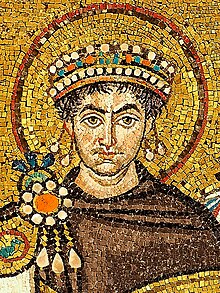Justinian the Great
| Justinian I | |||||
|---|---|---|---|---|---|
| Emperor of the Byzantine Empire | |||||

Detail of a contemporary portrait mosaic in the Basilica of San Vitale, Ravenna.
|
|||||
| Reign | 1 August 527 – 14 November 565 (38 years) |
||||
| Coronation | 1 August 527 | ||||
| Predecessor | Justin I | ||||
| Successor | Justin II | ||||
| Born | c. 482 Tauresium, Dardania, then part of Diocese of Dacia (in today's Republic of Macedonia) |
||||
| Died | 14 November 565 (aged 82/83) Constantinople |
||||
| Burial | Church of the Holy Apostles | ||||
| Spouse | Theodora | ||||
|
|||||
| Dynasty | Justinian | ||||
| Father | Sabbatius | ||||
| Mother | Vigilantia | ||||
| Religion | Chalcedonian Christianity | ||||
| Full name | |
|---|---|
| Petrus Sabbatius (until ascension) Flavius Petrus Sabbatius Iustinianus (as emperor) |
Justinian I (/dʒʌˈstɪniən/; Latin: Flavius Petrus Sabbatius Iustinianus Augustus; Greek: Φλάβιος Πέτρος Σαββάτιος Ἰουστινιανός Flávios Pétros Sabbátios Ioustinianós) (c. 482 – 14 November 565), traditionally known as Justinian the Great and also Saint Justinian the Great in the Eastern Orthodox Church, was a Byzantine (East Roman) emperor from 527 to 565. During his reign, Justinian sought to revive the empire's greatness and reconquer the lost western half of the historical Roman Empire. Justinian's rule constitutes a distinct epoch in the history of the Later Roman empire, and his reign is marked by the ambitious but only partly realized renovatio imperii, or "restoration of the Empire".
Because of his restoration activities, Justinian has sometimes been called the "last Roman" in modern historiography. This ambition was expressed by the partial recovery of the territories of the defunct western Roman empire. His general, Belisarius, swiftly conquered the Vandal kingdom in North Africa. Subsequently Belisarius, Narses, and other generals conquered the Ostrogothic kingdom, restoring Dalmatia, Sicily, Italy, and Rome to the empire after more than half a century of rule by the Ostrogoths. The prefect Liberius reclaimed the south of the Iberian peninsula, establishing the province of Spania. These campaigns re-established Roman control over the western Mediterranean, increasing the Empire's annual revenue by over a million solidi. During his reign Justinian also subdued the Tzani, a people on the east coast of the Black Sea that had never been under Roman rule before.
...
Wikipedia
